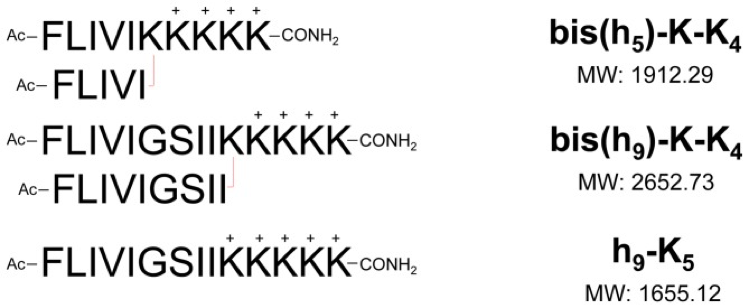
Branched Amphipathic Peptide Capsules (BAPC) are nanospheres made from an equimolar mixture of two branched peptides: bis(Ac-FLIVIGSII)-K-K4-CO-NH2 and bis(Ac-FLIVI)-K-K4-CO-NH2. These peptides self-assemble to form solvent-filled, bilayer defined capsules and originate from one of the pore-forming segments of the human heart L-type dihydropyridine sensitive calcium channel.

Due to the innate characteristics of their natural amino acid composition, BAPC demonstrate highly desirable properties that overcome many of the shortcomings of other nanocarriers.
BAPC are:
- Minimally toxic to cells
- Non-immunogenic
- Water Soluble
- Extremely stable
- Maintain structure in extreme heat
- Retain daughter cells of degrading radionuclides
- Biodegradable
- Resistant to detergents, proteases and chaotropes
BAPC excel as a nanocarrier due to how customizable they are to the needs of the application. Not only are they programmable in size from six nanometers to two micrometers, but they possess both encapsulation and surface binding capacity.
BAPC can encapsulate:
- Fluorescent Dyes
- Therapeutic Drugs
- Radionuclides
- Pesticides
- Fungicides
- Colloidal Gold
- Magnetic Beads
BAPC can be bound with:
- Proteins
- Sugars
- dsRNA
- siRNA
- Oligonucleotides
- Plasmids
- CRISPR-Cas9 components
As a non-viral nucleic acid delivery vector, BAPC are the superior option for both in vitro and in vivo systems. In vitro research with BAPC has explored transfection of numerous cell lines including HEK, HeLa and murine dendritic cells. Not only did BAPC match or exceed the transfection efficiency of several leading products, but it did so with negligible cytotoxicity.
In vivo research has demonstrated BAPC can deliver a vaccine DNA encoding the E7 oncoprotein of HPV-16 in mice. The immunized mice saw constrained tumor growth up to one month after transplantation of tumor cells without any significant toxic effects. Imaging demonstrated that BAPC interacted with plasmid DNA to act as cationic nucleation centers with the negatively charged DNA bound to the outer surface. This demonstrates that BAPC work as an excellent delivery vehicle to facilitate the uptake of plasmid DNA.
As the most adaptable nanocarrier on the market, BAPC have the potential to revolutionize the development and delivery of everything from vaccines and cancer therapies to biopesticides and plant nutrition. Whether you work in academia or private industry, a better nanocarrier is now available.
